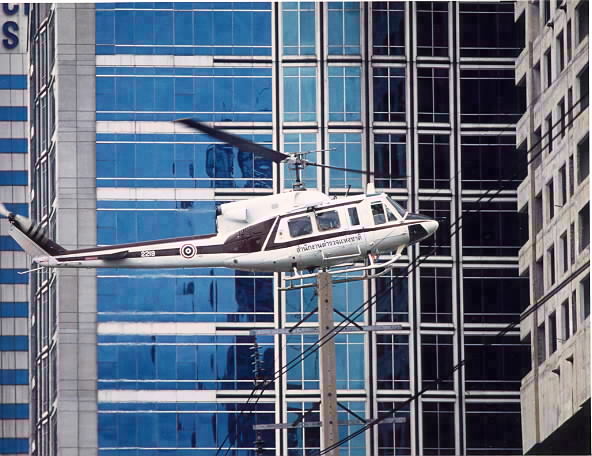
VIGOROUS BURMESE STUDENT WARRIORS
In the run-up to September 9, 1999, there was great frustration among Burmese
exile groups resident in Thailand and just across the border in the mountains
of Burma that no progress was being achieved in the efforts to bring down the
dictatorship. There was much talk about the need for stronger action. On the
“four 9's” itself, hundreds of Burmese, representing a dozen different
groups, demonstrated at the Burma Embassy in Bangkok. (Please see the next photo
essay.)
It was a good demo, but other than that - it generated a fair amount of press
coverage - it led to nothing else.
A new group, calling themselves the Vigorous Burmese Student Warriors, decided
to take action and make a strong symbolic statement. Shortly after the “four
9's,” in October, and using armed force, they took over the Embassy. It
was even suggested that they planned to kidnap or kill the Burmese Ambassador,
but failed at this because he left the Embassy compound shortly before they
arrived. They held the Embassy, cut down the dictatorship’s flag, and then
bargained for a helicopter (reportedly using files taken from the Ambassador’s
safe identifying Burmese spies operating in Thailand, which took them to the
border.
It seemed a hugely successful action, since it create massive worldwide publicity
about Burma, and since no one was hurt. It was, however, an unethical action,
and it had great consequences.
While one can argue that the Burma Embassy in Bangkok is Burmese territory (this
is technically the case according to accepted diplomatic protocol), taking the
fight to another sovereign nation was a great affront to that nation and entailed
all manner of risk. Also, participants in a war, even if their participation
is fully justified because they are fighting in self-defense, are still obliged
to act ethically. In this regard, it is unethical to involve non-combatants
(or to employ torture). The VBSW took prisoners - hostages - including Thai
staff resident at the Embassy, and foreign tourists and Thai businesspeople
who were applying for Burmese visas. This was unethical, and unacceptable.
In addition, the consequences which developed from the action were extreme.
The takeover of the Embassy in broad daylight caused the Thai government to
lose a tremendous amount of face, and as their subsequent actions demonstrated,
they were very upset. The Burmese army launched an assault on the area where
the VBSW had taken refuge and the Thais supported this fully, even shelling
the group and their local supporters from the Thai side of the border. The VBSW
and their allies were being attacked from both sides. Suffering great losses,
and in desperation, they sent a group which re-entered Thailand, commandeered
a vehicle, and proceeded to a hospital in the nearby town of Ratchaburi. They
launched an action on the hospital, reportedly to get doctors to accompany them
back to Burma to treat their wounded. The hospital was sealed by the Thai police,
and in the dead of night Thai commandos conducted a raid. Accounts suggest that
the group surrendered, without anyone present inside the hospital having been
injured. Their dead and naked bodies, wrapped in bedsheets, were brought out
the next morning. The Thai government got its revenge for the slight it had
suffered.
The consequences did not end there, though. Demonstrations at the Embassy, previously
a regular occurrence, were prohibited. (In the Summer of 2001, a small demo
was held at the embassy by Amnesty International.) Burmese students exiled in
Thailand and resident at a location called Maneeloy, were put under conditions
approximating that of a prison camp. Under great pressure from the Thai government,
most of them have been relocated to other countries and given refugee status.
(Many would have preferred to stay close to their homeland.) There was a crackdown
on - the forcible closure of - democracy and human rights groups, both Burmese
and foreign, particularly in Chiang Mai. And lastly, the Thai government engaged
in a series of draconian round-ups of Burmese workers in the country, deporting
them back to Burma and an uncertain fate at the hands of the dictatorship.
Dictator Watch happened to be in Bangkok at the time of the Embassy takeover,
heard news of it on television, and rushed to the scene, documenting some of
the events which followed.
This is the helicopter that flew the VBSW, and hostage foreign tourists, to the border.
The embassy takeover was a major media event.
There was extensive security, but the general atmosphere was remarkably calm.
Negotiation was handled my senior police on-site, in continuous contact with the leaders of the country.
This brave individual did the actual direct negotiation with the VBSW.
There was
a real concern that the Thai commandos would launch an attack and that some
people might be killed.
This individual, one of the hostages, personally negotiated with the police
and got them to back off.
He was a hero, playing a major role in ensuring that the takeover ended peacefully.
The commandos
were ready, but were held off.
This was not to be the case, later in Ratchaburi, away from the lights of Bangkok
and the cameras of the media.
© Roland O. Watson 2001-3